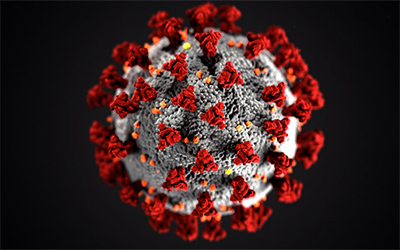By Jim Ellis

COVID-19 virus
With so many early primary states postponing their primary elections in conjunction with the disease precautions, we now see either all-mail systems, or including the mail option for all voters, being utilized for upcoming primary elections in 20 additional states, and the list keeps growing.
Predictably, progressive left voter organizations are using the pandemic as a catalyst to push for their long-term election systemic goals. Lawsuits around the country are being filed in such places as Indiana, Pennsylvania, Texas, and several other states, to expand the all-mail option from the primaries into the general election. And, once the all-mail system has been instituted in places around the country, thus establishing it as an electoral fixture, the process becomes much easier to make permanent.
Additionally, we are seeing further lawsuits filed to include automatic voter registration, prohibiting the purging of registration names of people who consistently haven’t voted in multiple elections, and the controversial ballot harvesting idea that allows any voter to collect ballots and deliver them to election authorities.
The Pew Research Center just completed a nationwide survey, testing the population about their attitudes and perceptions of these types of procedural issues. It came as no surprise that the survey results produced rather polarizing responses from the self-identified affiliates of the two major political parties, since virtually every contemporary issue yields deep divides between the partisans.
The Pew Poll was conducted through what they term as the American Trends Panel (ATP), and the parent organization contracts with the Ipsos international research organization to administer the study. The ATP constitutes a universe of 6,092 US adults who respond to the Pew online surveys. Regarding the current voter systems study, which was conducted during the April 7-12 period, 4,917 members of the aggregate group participated for a response rate of just under 81 percent.
To begin, two-thirds of the respondents, 67 percent, believe it is very likely or somewhat likely that the COVID-19 disease will disrupt the November election in some way. Dividing into partisan segments, 80 percent of the sample Democrats and Democrat leaners believe so as compared to just 50 percent of the self-identified Republicans and Republican leaners.
Another area of polarization concerns whether the respondents believe “the November election will be conducted fairly and accurately”, and whether “all citizens who want to vote will be able to.”
A total of 59 percent of the sample says they believe the election will be fair and accurate, though this number was reached because of predominant support among the sample Republicans (76 percent), but only 46 percent of Democrats share the sentiment.
Responding to the question about whether or not all voters who want to vote will be able to do so, 63 percent of the full sample believes such will be the case. Again, however, it is the overwhelming number of Republicans expressing agreement (87 percent) that led to the final total. Among the self-identified Democrats, only 43 percent agreed.
Voting by mail enjoys wide support within the respondent universe. A net 70 percent supports “allowing any voter to vote by mail if they want to,” and 69 percent favor “automatically registering all eligible citizens to vote.” In this case, 87 percent of Democrats favor allowing voters who want to vote by mail be allowed to do so, while only 49 percent of Republicans agree. On the automatic registration question, 84 percent of the responding Democrats favor the concept while 53 percent of Republicans responded positively.
No question about implementing a verification system regarding the mail or registration programs was included, which is generally what opposing Republican leaders site as their top objection to the system.
Clearly, the COVID-19 situation has given the election change proponents a unique chance to jump start their goal implementation, and it is obvious they are maximizing their opportunities. It remains to be seen just how many of the states permanently adopt the new procedures for future elections.
